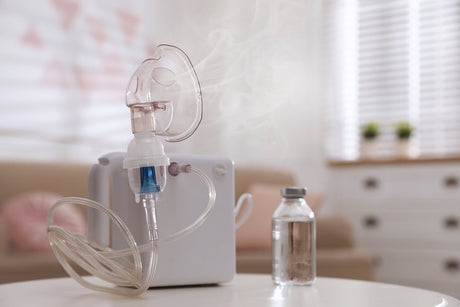Hiatal hernia, COPD, and GERD are three distinct medical conditions, each with its own set of symptoms and implications. However, recent research has hinted at some potential links between hiatal hernia and COPD, indicating that these conditions may influence and exacerbate each other. In this article, we will delve into the interconnection between hiatal hernia and COPD, how they can affect lung function, and their association with gastro-oesophageal reflux disease (GERD).
To begin, a hiatal hernia doesn't directly cause COPD, but there may be a connection between the two conditions. COPD primarily affects the lungs, resulting in symptoms such as difficulty breathing, coughing, and reduced lung function. While COPD itself doesn't lead to a hernia, the increased chest pressure due to lung issues associated with COPD can contribute to the development of a hiatal hernia. The weakened diaphragm muscles and abdominal strain may create conditions that favor the formation of a hiatal hernia. Let’s take a step back and look at each of these conditions individually.
What is COPD?
COPD is a chronic lung disease that makes it hard to breathe. It is caused by long-term exposure to irritants that damage the airways and the alveoli, the tiny air sacs in the lungs. COPD includes two main types: chronic bronchitis and emphysema. Chronic bronchitis is inflammation of the lining of the airways, which causes mucus production and coughing. Emphysema is the destruction of the alveoli, which reduces the surface area for gas exchange and causes shortness of breath.
COPD is a progressive disease, meaning it gets worse over time. There is no cure for COPD, but treatment can help slow down the progression and improve the quality of life. Some of the common treatments for COPD are:
- Medications, such as bronchodilators, corticosteroids, antibiotics, and mucolytics
- Oxygen therapy, which provides supplemental oxygen to help with breathing
- Pulmonary rehabilitation, which is a program of exercise, education, and counseling to help with physical and mental health
- Surgery, such as lung volume reduction surgery or lung transplantation, which are options for severe cases
What is a Hiatal Hernia?
A hiatal hernia is a condition where part of your stomach pushes up through your diaphragm, the muscle that separates your chest from your abdomen. Normally, your esophagus passes through a small opening in your diaphragm called the hiatus. When you have a hiatal hernia, the hiatus becomes enlarged and allows part of your stomach to slip through.
There are two main types of hiatal hernias: sliding and paraesophageal. A sliding hiatal hernia is when the lower part of your esophagus and the upper part of your stomach slide up into your chest. This is the most common type of hiatal hernia. A paraesophageal hiatal hernia is when part of your stomach squeezes through the hiatus and stays next to your esophagus. This is less common but more serious.
Symptoms of Hiatal Hernia
The symptoms of hiatal hernia can vary, but common signs include:
- Heartburn or acid reflux
- Chest pain or discomfort
- Difficulty swallowing
- Belching or regurgitation
- Feeling of fullness after meals
Hiatal Hernia and COPD Exacerbation
A hiatal hernia can affect COPD in several ways. First, a hiatal hernia can cause GERD, which can worsen COPD symptoms and exacerbate COPD flare-ups. GERD can cause inflammation and irritation of the airways and lungs, which can increase mucus production and coughing. GERD can also cause aspiration of stomach contents into the lungs, which can cause infection and pneumonia. GERD can also trigger asthma-like symptoms such as wheezing and shortness of breath.
Second, a hiatal hernia can reduce lung function and capacity by compressing the lungs and diaphragm. A hiatal hernia can reduce the space available for the lungs to expand and contract during breathing. A hiatal hernia can also impair the movement of the diaphragm, which is the main muscle involved in breathing. A hiatal hernia can make it harder to breathe deeply and efficiently.
Third, a hiatal hernia can increase the risk of complications from COPD such as pulmonary hypertension and cor pulmonale. Pulmonary hypertension is high blood pressure in the arteries that carry blood from the heart to the lungs. Cor pulmonale is enlargement and failure of the right side of the heart due to pulmonary hypertension. A hiatal hernia can increase pressure in the chest cavity and interfere with blood flow to and from the lungs. A hiatal hernia can also cause hypoxemia (low oxygen levels in the blood) by affecting gas exchange in the lungs.
How Does COPD Cause a Hiatal Hernia?
COPD can cause a hiatal hernia by increasing pressure in the chest cavity and weakening the diaphragm. COPD causes air trapping in the lungs, which means that some air remains in the lungs after exhaling. This increases pressure in the chest cavity and pushes against the diaphragm and stomach. COPD also causes chronic coughing, which strains the diaphragm and stomach muscles. COPD also causes emphysema, which reduces lung elasticity and makes it harder for the diaphragm to contract. All these factors can contribute to the development of a hiatal hernia.
To manage COPD exacerbations effectively, it is crucial to address both conditions simultaneously. This may involve lifestyle changes, dietary modifications, and medication adjustments to control GERD symptoms and reduce its impact on COPD.
Let’s talk about GERD, Hiatal Hernias, and COPD
While a hiatal hernia can influence COPD symptoms and exacerbate the condition, it is more often the case that a hiatal hernia can cause GERD, a condition where stomach acid flows back into the esophagus. GERD is associated with respiratory symptoms like coughing and wheezing, which can worsen those with COPD symptoms. Proper management of hiatal hernia and GERD is essential to prevent complications in COPD patients.
What is GERD?
GERD stands for gastroesophageal reflux disease. It is a condition where stomach acid flows back up into your esophagus, the tube that connects your mouth to your stomach. This can irritate and damage the lining of your esophagus and cause symptoms such as heartburn, chest pain, difficulty swallowing, regurgitation of food or acid, coughing, hoarseness, sore throat, and bad breath.
GERD can be caused by many factors, such as:
- A hiatal hernia, which weakens the lower esophageal sphincter (LES), the valve that prevents stomach acid from flowing back up
- Obesity, pregnancy, or tight clothing, which increase pressure on your abdomen and push stomach contents up
- Smoking, alcohol, caffeine, chocolate, spicy foods, fatty foods, citrus fruits, tomatoes, mint, garlic, onions, or other foods that relax the LES or trigger acid production
- Medications such as aspirin, ibuprofen, naproxen, steroids, antihistamines, antidepressants, calcium channel blockers, or nitrates that affect the LES or increase acid production
- Stress or anxiety that affects digestion or increases acid production
The Link Between COPD and GERD
COPD and GERD are distinct conditions, but they can be interconnected in several ways. The chronic coughing and increased abdominal pressure caused by COPD can contribute to the development or worsening of GERD. Additionally, GERD can exacerbate respiratory symptoms in COPD patients.
How to Distinguish Between COPD and GERD
Differentiating between COPD and GERD is crucial for accurate diagnosis and appropriate treatment. The following factors can help distinguish between the two conditions:
- COPD symptoms are more pronounced during physical activity and may be linked to smoking or exposure to pollutants.
- GERD symptoms often worsen after meals, when lying down, or during the night. Heartburn and regurgitation are typical GERD symptoms.
Consulting a healthcare professional and undergoing diagnostic tests, such as lung function tests and endoscopy, can aid in accurate diagnosis.
Treatment for GERD
Treatment for GERD involves a combination of lifestyle changes and medications. Lifestyle modifications may include simple actions like avoiding trigger foods and beverages, eating smaller and more frequent meals, and not lying down after eating.
Medications like antacids, H2 blockers, and PPIs can help reduce stomach acid and alleviate GERD symptoms. In severe cases or when medications and lifestyle changes are ineffective, surgical options may be considered.
The Connection and Impact on Lung Function
A hiatal hernia can affect lung function, particularly when it is large and compresses the lungs. This can lead to decreased lung capacity and oxygen intake, contributing to breathing difficulties. Furthermore, the presence of GERD in individuals with hiatal hernia and COPD can trigger inflammation and bronchoconstriction, further impacting lung function.
Treatments are available for all of these conditions, so those who suspect they may be suffering from one or more of these interconnected illnesses should contact their medical professionals for assistance in getting relief from the discomfort produced by GERD, hiatal hernias, and COPD.
FAQs (frequently asked questions)
Can a hiatal hernia cause low oxygen?
While a hiatal hernia itself doesn't directly cause low oxygen levels, a large hernia that compresses the lungs can restrict their expansion, leading to reduced oxygen intake and potentially lower oxygen levels in the blood.
Can GERD cause breathing problems? Why?
Yes, GERD can cause breathing problems in some individuals. The backflow of stomach acid into the esophagus can irritate the airways, leading to inflammation and bronchoconstriction, resulting in breathing difficulties.
Is Apple cider vinegar good for COPD?
There is limited scientific evidence supporting the use of apple cider vinegar for COPD management. It is crucial to consult a healthcare professional before using alternative remedies.
Can GERD cause asthma in people without asthma?
GERD can produce asthma-like symptoms in individuals without a history of asthma. Stomach acid irritation can trigger inflammation and bronchoconstriction, mimicking asthma symptoms.
How long can a hernia go untreated?
A hernia, including hiatal hernias, should not be left untreated. Larger hernias can lead to complications such as GERD or lung compression. Seeking medical attention and discussing treatment options with a healthcare professional is crucial for effective management
As a leading supplier of durable and home medical equipment (DME and HME), ApriaHome sources and distributes a wide range of treatment solutions, including assistive respiratory equipment and monitoring solutions.
We're here to support you as you work toward your improved health and well-being. We strive to meet your ever-evolving healthcare requirements with individualized attention and premium quality treatment solutions.
Looking to add respiratory supplies? Browse our premium solutions and let us help you get the most out of every day.
Looking for advice? Our helpful agents are on call at (800) 780-1508 between 8:00 am - 10:00 pm EST daily. Get in touch today.





